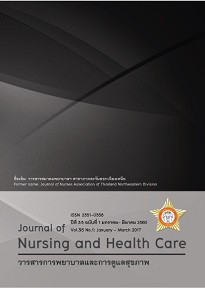ผลของโปรแกรมการป้องกันโรคไข้เลือดออกต่อ ความรู้ ทัศนคติ และการปฏิบัติ ของแกนนำชุมชน อำเภอเมือง จังหวัดพะเยา The Effect of Dengue Hemorrhagic Fever Prevention Program on knowledge, attitude and practice of community leaders in Muang District, Phayao Pr
คำสำคัญ:
โรคไข้เลือดออก, โปรแกรมป้องกันโรคไข้เลือดออก, ความรู้ ทัศนคติ การปฏิบัติ Dengue Hemorrhagic Fever, Dengue Hemorrhagic Fever Prevention Program, Knowledge Attitude Practiceบทคัดย่อ
บทคัดย่อ
การวิจัยนี้เป็นการวิจัยแบบกึ่งทดลอง (Quasi- Experimental Research ) แบบวัดซ้ำในกลุ่มเดียวกัน (One Group Pretest- Posttest Design ) เพื่อศึกษาผลของโปรแกรมการป้องกันโรคไข้เลือดออกต่อ ความรู้ ทัศนคติ และการปฏิบัติ ของแกนนำชุมชน ตำบลแม่ต๋ำ อำเภอเมือง จังหวัดพะเยา จำนวน 36 คน โดยใช้เวลาทั้งหมด 24 สัปดาห์ เครื่องมือประกอบด้วย 1) โปรแกรมการป้องกันโรคไข้เลือดออก 2) แบบวัดความรู้เรื่องโรคไข้เลือดออก 3) แบบวัดทัศนคติในการป้องกันและควบคุมโรคไข้เลือดออก 4) แบบวัดการปฏิบัติในการป้องกันและควบคุมโรคไข้เลือดออก 5) แบบสำรวจลูกน้ำยุงลาย วิเคราะห์ข้อมูลด้วยการแจกแจงความถี่ค่าร้อยละค่าเฉลี่ยเลขคณิตและส่วนเบี่ยงเบนมาตรฐาน เปรียบเทียบความแตกต่างของคะแนนเฉลี่ยทั้ง 3ตัวแปรด้วยสถิติ Paired t-test ผลการวิจัย พบว่าภายหลังแกนนำเข้าร่วมในโปรแกรมการป้องกันโรคไข้เลือดออก กลุ่มทดลองมีค่าเฉลี่ยของระดับความรู้เพิ่มขึ้นจาก (Mean 9.5, SD. 2.4) เป็น (Mean 11.2, SD. 2.4 ) ทัศนคติ เพิ่มขึ้นจาก (Mean 23.6, SD. 3.4) เป็น (Mean 26.3, SD. 2.2) และการปฏิบัติเพิ่มขึ้นจาก (Mean 23.4,SD. 3.9) เป็น (Mean 26, SD. 2.8 ) แตกต่างกันอย่างมีนัยสำคัญทางสถิติ (p< .01) ค่าดัชนีชี้วัดความชุกของลูกน้ำยุงลายมีค่า House Index เท่ากับ 5.6 ค่า Breteau Index เท่ากับ 22.2 มีค่าลดลง และอยู่ในเกณฑ์ปกติ
ผู้วิจัยมีข้อเสนอแนะว่าควรนำโปรแกรมป้องกันโรคไข้เลือดออกไปทดสอบประสิทธิผลเพื่อป้องกันหรือควบคุมไข้เลือดออกในชุมชน โดยมีการปรับปรุงให้มีความเหมาะสมกับบริบทในแต่ละพื้นที่เพื่อเพิ่มประสิทธิภาพในการป้องกันและควบคุมโรคไข้เลือดออกในชุมชน
Abstract
This quasi- experimental study (One Group Pretest- Posttest Design) aimed to examine the effect of Dengue Hemorrhagic Fever (DHF) prevention program on knowledge, attitude and practice of community leaders in Maetum Subdistrict, Muang District, Phayao Province. Samples were 36 community leaders. Data collection lasted 24 weeks. Research instruments included 1) The Dengue Hemorrhagic Fever Prevention Model 2) The Knowledge of Dengue Hemorrhagic Fever Questionnaire. 3) The Attitude towards Prevention and Control of Dengue Hemorrhagic Fever Questionnaire. 4) The Practice of Prevention and Control of Dengue Hemorrhagic Fever Questionnaire. 5) Visual larval survey. Data were analyzed using frequency, percentage, mean, standard deviation; differences in means of three variables were compared using paired t-test.
Results of the study showed that after receiving the program, the study group’s post-mean score (Mean 11.2, SD. 2.4 ) of knowledge was significantly higher than the pre-mean score (Mean 9.5,SD. 2.4) ; that of attitude(Mean 26.3, SD. 2.2) was significantly higher than the pre-mean score (Mean 23.6, SD. 3.4) ;and that of practice(Mean 26, SD. 2.8) was significantly higher than the pre-mean score (Mean 23.4,SD. 3.9) (p< .01). House index (H.I. = 5.6) and Breteau index (B.I. = 22.2) were decreased and normal level.
It is suggested that the program should be further tested for its effectiveness on prevention or control of Dengue Hemorrhagic Fever in community. The program needs to adapt for variety context which increased the effectiveness of the program to prevent Dengue Hemorrhagic Fever in the community.



